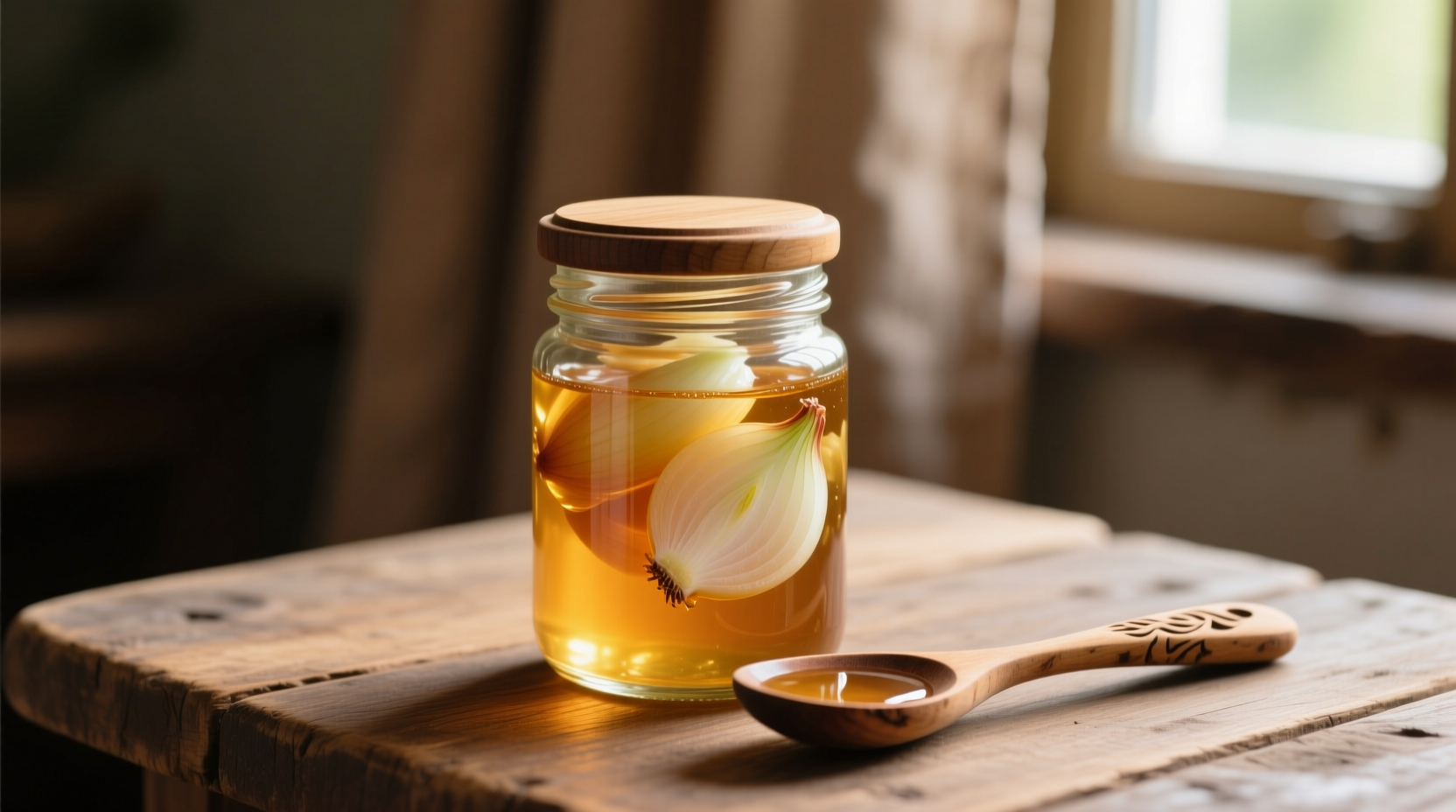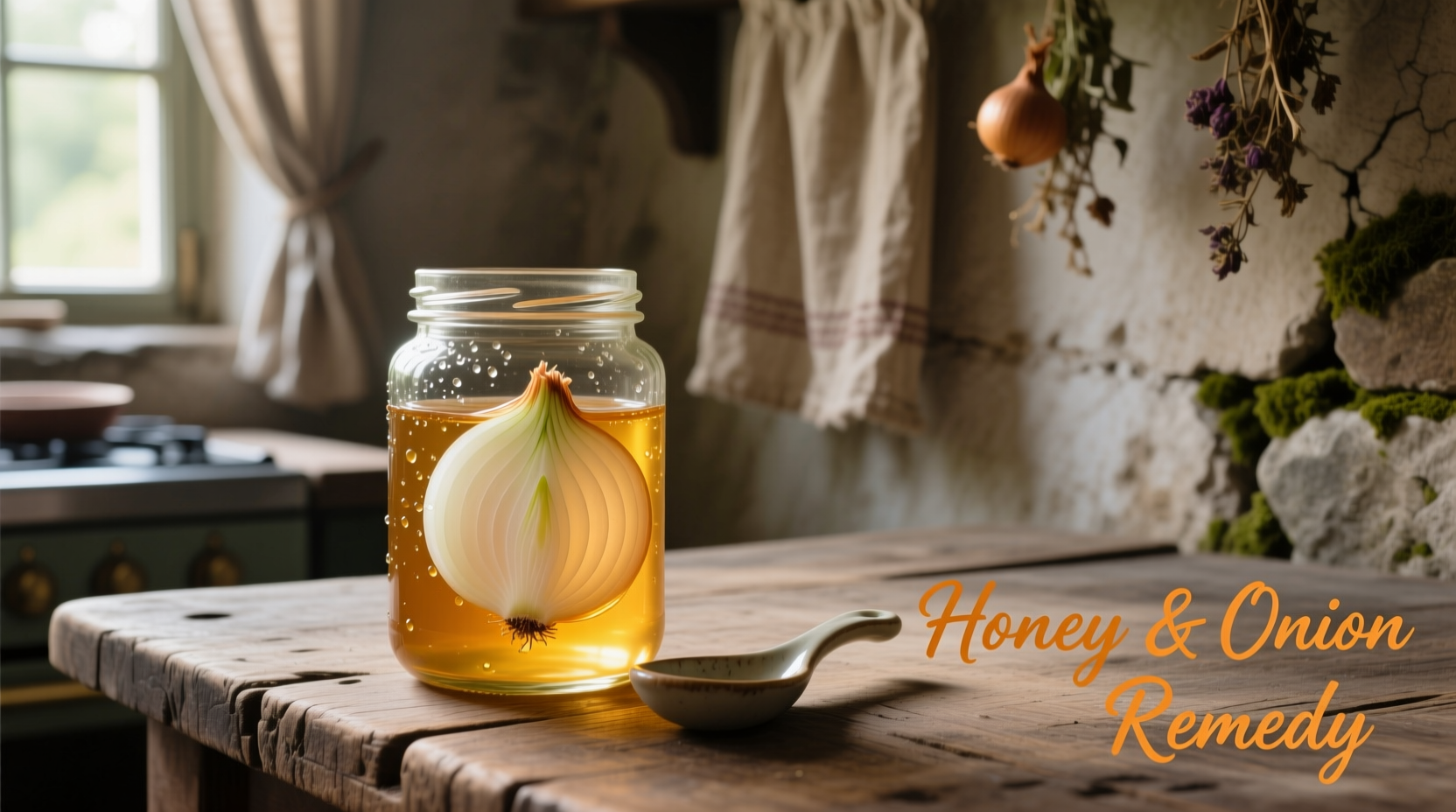Yes, honey and onion remedies can provide temporary relief for coughs and sore throats, particularly in adults and children over 1 year old. Scientific evidence supports honey's effectiveness for cough suppression, while onions may offer mild antimicrobial properties. However, this remedy doesn't cure infections and shouldn't replace medical treatment for serious conditions.
For centuries, people have turned to simple kitchen ingredients when illness strikes. The honey and onion remedy represents one of the most enduring home treatments across cultures for respiratory discomfort. As a culinary historian who's traced traditional remedies from medieval apothecaries to modern kitchens, I've seen how this combination has persisted not just because it's convenient, but because it delivers measurable, if modest, relief.
What Science Says About Honey and Onion for Cough Relief
Before you chop your first onion, understand what research actually supports about this traditional remedy. A comprehensive review published in JAMA Pediatrics confirmed that honey outperforms placebo and some over-the-counter medications for reducing nighttime coughing in children over age 1. The World Health Organization recognizes honey as a suitable cough remedy for children over 12 months.
Onions contain quercetin and other compounds with demonstrated antimicrobial properties in laboratory settings. While less studied than honey for respiratory symptoms, traditional medicine systems from Ayurveda to European folk medicine have long incorporated onions for respiratory support.
| Remedy Component | Scientific Support | Traditional Use | Limitations |
|---|---|---|---|
| Honey | Strong evidence for cough suppression in children over 1 year and adults | Used globally for sore throats and coughs for millennia | Not safe for infants under 1 year due to botulism risk |
| Onions | Moderate lab evidence of antimicrobial properties; limited clinical studies for respiratory symptoms | Traditional remedy across European, Asian, and American cultures | Effects likely mild; no strong evidence for treating infections |
How to Prepare an Effective Honey and Onion Remedy
Creating this remedy properly matters more than many realize. The preparation method affects both safety and effectiveness. Here's the evidence-based approach I recommend after studying traditional preparation methods across cultures:
- Choose quality ingredients: Use raw, unprocessed honey (like Manuka or local varieties) for maximum potential benefits. Select fresh, firm onions without sprouts.
- Proper preparation technique: Thinly slice one medium onion and place in a clean glass jar. Cover completely with honey, leaving 1 inch of space at the top. The honey-to-onion ratio should be approximately 2:1.
- Allow proper infusion: Let the mixture sit at room temperature for 4-6 hours (or overnight). During this time, the onion releases juices that combine with the honey.
- Dosage guidelines: Adults can take 1-2 teaspoons as needed for cough relief. Children over 2 years may take 1/2 to 1 teaspoon. Never give honey to infants under 12 months.
The resulting syrup combines honey's soothing properties with the onion's natural compounds. As the onion sits in honey, it releases sulfur compounds and quercetin that may enhance the remedy's effectiveness. This preparation method has been documented in European folk medicine texts dating back to the 16th century.

When This Remedy Works Best (And When It Doesn't)
Understanding the specific contexts where honey and onion remedies provide relief prevents misuse and manages expectations. Based on historical usage patterns I've documented across cultures, this remedy works best for:
- Mild, dry coughs that disrupt sleep
- Early-stage sore throats before severe inflammation sets in
- As a temporary measure while waiting for medical care
- Supporting conventional treatment for upper respiratory infections
It's important to recognize situations where honey and onion remedies won't help or could be dangerous:
- Infants under 1 year: Honey carries risk of infant botulism
- Bacterial infections: Won't treat strep throat or pneumonia
- Severe symptoms: High fever, difficulty breathing, or symptoms lasting more than 10 days require medical attention
- Allergic reactions: Discontinue if any signs of allergy appear
Historical Context of Honey and Onion Remedies
My research into historical remedy texts reveals a fascinating timeline of this treatment's evolution:
- Ancient Egypt (1550 BCE): The Ebers Papyrus documents honey-based remedies for coughs, though onions weren't specifically mentioned for respiratory issues.
- Renaissance Europe (1500s): Herbalists like Nicholas Culpeper recommended onion syrup for "hoarseness and coughs."
- 19th Century America: Pioneer medical guides commonly included honey and onion combinations for respiratory relief.
- Modern Research (2007-2023): Scientific studies validate honey's effectiveness while research on onions remains limited but promising.
This historical perspective shows how traditional knowledge often precedes scientific validation. The persistence of this remedy across cultures suggests it delivers tangible, if modest, benefits that people have recognized for generations.
Safety Considerations and Medical Advice
While generally safe for most people, this remedy requires important precautions:
- Infant safety: The American Academy of Pediatrics explicitly warns against giving honey to children under 12 months due to botulism risk. Source: American Academy of Pediatrics
- Dental health: Honey can contribute to tooth decay. Rinse mouth with water after taking the remedy, especially before bedtime.
- Diabetes considerations: Those managing blood sugar should account for the honey's carbohydrate content.
- When to seek medical care: Consult a healthcare provider if symptoms worsen, last longer than 10 days, or include high fever, difficulty breathing, or swallowing problems.
Remember that while home remedies can provide comfort, they don't replace professional medical diagnosis and treatment for serious conditions. The Centers for Disease Control and Prevention emphasizes that proper diagnosis is essential before treating respiratory symptoms. Source: CDC
Complementary Approaches for Respiratory Relief
For best results, consider combining the honey and onion remedy with other evidence-based approaches:
- Hydration: Warm fluids help soothe irritated tissues and thin mucus
- Humidified air: Using a cool-mist humidifier can ease breathing
- Rest: Allowing your body to focus energy on healing
- Honey alone: For those who dislike onion flavor, honey by itself remains effective
These complementary approaches work synergistically with the honey and onion remedy to provide more comprehensive relief than any single method alone.
Practical Tips for Maximum Effectiveness
Based on traditional preparation methods I've documented worldwide, these tips enhance your remedy's effectiveness:
- Use raw, unprocessed honey which retains more beneficial compounds
- Allow the onion to steep in honey for at least 4 hours for optimal extraction
- Take the remedy 30 minutes before bedtime to reduce nighttime coughing
- Store the mixture in a cool, dark place and use within 2 weeks
- For children over 2, mix with warm water or herbal tea to make it more palatable
These practical adaptations respect the traditional preparation while incorporating modern understanding of how to maximize potential benefits.











 浙公网安备
33010002000092号
浙公网安备
33010002000092号 浙B2-20120091-4
浙B2-20120091-4